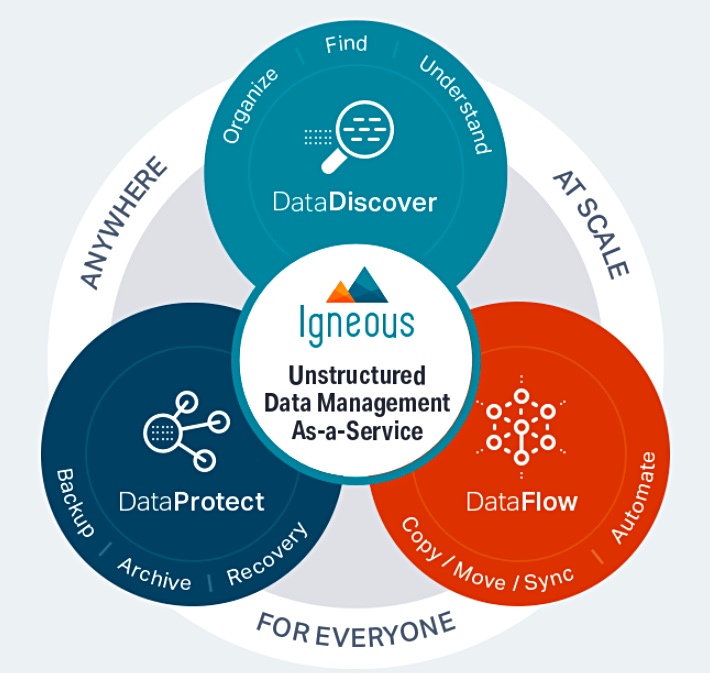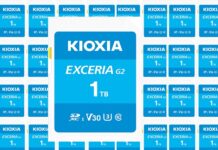August is coming to a close. Here is a round-up of storage news for the past few days.
AI-powered personal NAS
Say hello to Latticework’s Amber, a personal NAS that made its debut this week. It is also the “first-ever, AI-powered smart storage platform that allows users to safely backup, store and organise their digital data in the privacy of your own home while being able to access and share remotely with Amber’s Personal Hybrid Cloud.”
The classy-looking Amber box is a cube with rounded corners and a LED ring light in its top.

It has an Intel Gemini Lake (Celeron/Pentium Silver class) CPU, two mirrored hard disk drives (2TB or 4TB max), loads of ports and a WiFi router. Amber is about the size of a bookshelf speaker and provides a personal hybrid cloud. It features music/video streaming and has, Latticeworks says, AI-powered data organisation for photos, videos and other files.
The personal hybrid cloud aspect means the box can be accessed over the internet and data copied to the LatticeNest cloud for protection and wide access and sharing.
Yes, but what does AI-powered mean? The tech specs say it has AI-Powered Facial Indexing.. In other words it has algorithms for the recognition of faces in images; How disappointing.
Amber is available in the USA now, at $549, and may appear in Europe and Asia in the next few quarters.
Batman Vexata and Robin.io
All-flash array vendor Vexata is pairing up with Robin.io to add Kubernetes capability. This means its array can provide storage for stateful containers in Kubernetes-orchestrated devops shops.
Robin.io is a hyperconverged Kubernetes system i.e. it has its own storage. Why buddy with Vexata? The answer is Robin.io has no intrinsic physical storage capability – its container-based software sits between the application and the infrastructure. Enter Vexata and its array. The Robin platform extends Kubernetes with built-in storage, networking, and application management for Oracle databases and its ecosystem of applications such as WebLogic Server, Oracle RAC and EBS.
Vexata now gets to play in this sandpit. The two said customers can provision databases in minutes, scale on-demand, reduce costs, and accelerate Oracle workloads.
StorCentric, Vexata’s parent company, intends to add a Robin.io facility to its Nexsan arrays, which provide unified file and block storage and secure archiving.
Robin.io was founded in 2013 and has taken in $46m in funding.
Igneous puts DataDiscover in the AWS Marketplace
Igneous ’s basic UDMaaS – Unstructured Data Management as a service – product provides data protection, movement and discovery for file and object data. There are three components; DataDiscover (file analytics), Data Protect (backup, archive, recover) and Data Flow (copy, move, sync.)

DataDiscover continuously finds files in NAS stores through API integrations for devices from NetApp, Isilon, Pure Flashblade, and Qumulo. It supports any NFS- or SMB-based filesystem. Igneous says it scans billions of files in the space of hours, totting up how much data customers have on primary NAS, how old it is, and where it’s located.
The idea is they can shunt off old file data to cheaper storage; AWS’ S3 Glacier Deep Archive, for example, and so save money.
Try out a DataDiscover test drive.
Shorts
Cloud storage supplier Backblaze has opened a data centre in Amsterdam, its first in Europe. It has two data centres in California and one in Arizona. It is also introducing the concept of regions, starting with EU Central and US West.
IBM is open-sourcing reference designs for the architecture-agnostic Open Coherent Accelerator Processor Interface (OpenCAPI) and the Open Memory Interface (OMI). The OpenCAPI and OMI technologies help maximise memory bandwidth between processors and attached devices. It’s contributing the RTL for the OpenCAPI reference designs to the OpenCAPI Consortium.
Object Matrix has launched the latest version of its media focused object storage software, MatrixStore v4.1. It features compatibility with more hardware and operating systems, and updates to MatrixStore Vision, web admin and monitoring.
The ObjectiveFS v6.4 release includes fixes and performance improvements and optimisations from past releases, including 350+MB/sec read and write of large files.
Panzura has announced availability of its Log Analytics Service (LAS) within the Vision.AI offering. This multi-cloud log analytics platform claims always-on availability, one-click deployment and flexible scale at a fraction of the cost of Splunk
StorageCraft announced that an Evaluator Group TCO study shows that StorageCraft’s OneXafe scale-out converged solution has an almost 3:1 TCO advantage over traditional data protection systems that use data protection software and servers backing data up to a dedicated data protection storage system.
Storj Labs has a Tardigrade decentralized cloud storage platform offering storage, scalability into the exabyte range, security, and efficiency for individuals and organisations. It says that, about half the time, Storj is actually 2x faster than Amazon S3.







